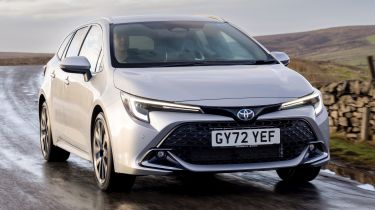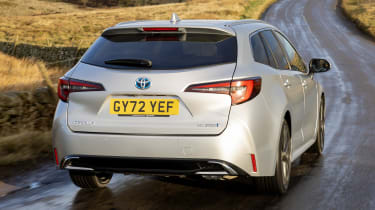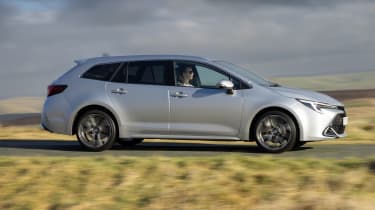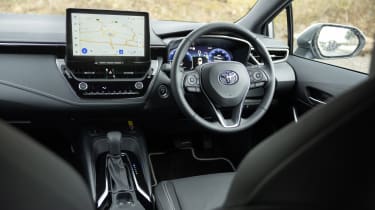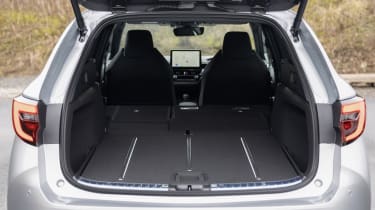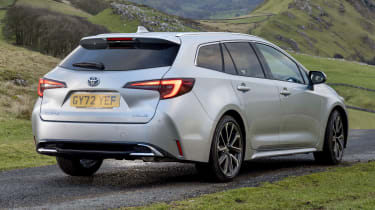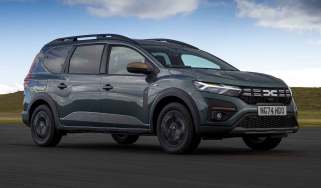Toyota Corolla Touring Sports review
The Toyota Corolla Touring Sports is probably the best estate car of its size on the market, with recent improvements helping to boost its appeal

The Toyota Corolla Touring Sports is not just a practical family estate car – it also rides and handles well, and offers low running costs thanks to its slick hybrid powertrain. But now the Corolla estate is better and more appealing than ever thanks to some recent upgrades. It’s more powerful than before, yet no less efficient, while the new infotainment system is a big improvement over the set-up featured at launch.
About the Toyota Corolla Touring Sports
The first estate car version of the Toyota Corolla was introduced all the way back in 1967, less than a year after the original Corolla saloon hit the streets of the Japan. Today, the more practical bodystyle may not be as popular as it once was after the rise of the family SUV, but the 12th-generation Corolla has stuck with tradition and is still available as a five-door wagon, dubbed Toyota Corolla Touring Sports.
Underneath is the same TNGA platform used by Toyota’s C-HR and the Lexus UX compact SUVs. The Corolla is available exclusively with full-hybrid power, which means you have a choice of 1.8-litre and 2.0-litre petrol engines paired with an electric motor and a CVT automatic gearbox.
As well as the two engines, buyers can pick one of four trim levels – Icon, Design, GR Sport and Excel – with prices starting from over £31,500 – roughly £1,500 more than the Corolla hatchback. Standard kit includes the 10.5-inch touchscreen, built-in sat-nav, over-the-air update capability, Apple CarPlay and Android Auto smartphone connectivity, dual-zone climate control, 16-inch alloy wheels, LED headlights, a reversing camera, Toyota’s Safety Sense tech and wireless smartphone charging.
Used - available now

2022 Toyota
Corolla
21,448 milesAutomaticPetrol1.8L
Cash £16,087
2022 Toyota
Corolla
43,514 milesAutomaticPetrol1.8L
Cash £14,800
2022 Toyota
Corolla
23,241 milesAutomaticPetrol1.8L
Cash £17,000
2022 Toyota
Corolla
7,415 milesAutomaticPetrol1.8L
Cash £17,640Key rivals in the class include the Skoda Octavia Estate, Vauxhall Astra Sports Tourer, Volkswagen Golf Estate, Ford Focus Estate and Peugeot 308 SW. The Skoda Superb Estate is another option – even though it’s much larger than the Corolla Touring Sports, and offers significantly more space as a result, it has a similar starting price to the Toyota.
Those considering the Corolla because of its efficient hybrid powertrain may also want to take a look at the fully electric MG5 EV. The recently refreshed zero-emissions estate car might not match the Corolla for boot space, but it’s big enough for most families and should be even cheaper to run than the Toyota.
Engines, performance and drive
The updated Corolla’s more powerful electric motor makes it feel livelier in EV mode, as well as easier and smoother to drive at low speeds than before.
That is until you activate the adaptive brake regeneration system, which changes the level of deceleration when you lift off the throttle based on traffic conditions and the road ahead. We’ve experienced similar systems in some electric cars, unfortunately the Corolla’s was somewhat unpredictable, making it hard to get along with.
The dynamic performance is very similar to the hatchback, in that the Corolla Touring Sports estate rides, handles and steers sweetly. It’s not quite as much fun to drive as a Ford Focus Estate, but our back-to-back tests found it’s both more comfortable and more fun to drive than the Golf Estate.
0-62mph acceleration and top speed
The 1.8-litre hybrid powertrain produces 138bhp and 142Nm of torque; enough to propel the Corolla Touring Sports from 0-62mph in 9.4 seconds – 0.3 seconds slower than the hatchback. Upgrade to the 2.0-litre hybrid and total power output jumps to 193bhp and 190Nm, cutting the 0-62mph time down to 7.7 seconds. Top speed for both versions stands at 112mph.
As is often the case with cars that use CVT transmissions, when you work the engine really hard you’re rewarded with a loud drone as the revs rise. That said, the extra electrical assistance in the updated Corolla means that happens less frequently than before.
MPG, CO2 and running costs
Toyota’s faithful ‘self-charging’ hybrid running gear continues to promise lower running costs and superior fuel economy compared to some of the traditional petrol and diesel alternatives. According to Toyota, 1.8-litre models can return up to 62.8mpg in the Corolla estate, while the 2.0-litre set-up with its larger petrol engine will return 64.2mpg in both forms.
We expect you’ll achieve more than 50mpg in everyday driving, but those who spend more of their time driving around town, where the Corolla’s petrol-electric hybrid system is at its best, shouldn’t find it hard to hit the Corolla Touring Sports’ claimed economy figures.
The Corolla also got a redesigned, lighter and more energy dense lithium-ion battery as part of its 2022 facelift, meaning it weighs 14 per cent less yet delivers 14 per cent more power. The enlarged battery allows it to go for longer without waking the engine and there is an EV mode you can activate, but time spent on electric power alone will add up through lots of fleeting moments instead of any longer stints of silent running.
The hybrid system does mean emissions – and therefore initial road tax and company car tax rates – are low. The 2.0-litre hybrid hatchback is the cleanest option emitting 100-105g/km of CO2, depending on the exact specification, meaning the Benefit-in-Kind (BiK) rate for company car users is 25 or 26 per cent.
The 1.8-litre model also produces a respectable figure of 101-107g/km of CO2, so falls into the same 25 or 26 per cent BiK tax bands, again depending on the exact spec you go for.
Insurance groups
Insurance ratings for the Toyota Corolla Touring Sports range from groups 17 to 22, depending on the engine and trim level. For context, the Vauxhall Astra Sports Tourer and Volkswagen Golf Estate both attract similar ratings.
Depreciation
Our latest expert data indicates the Toyota Corolla estate will retain between 55-57 per cent of its value after three years and 36,000 miles of motoring. In comparison, the Vauxhall Astra wagon should hold onto 47 to 50 per cent of its original value, while the Volkswagen Golf Estate performs slightly better – keeping between 47 and 56 per cent of its showroom cost after the same three-year period.
To get an accurate valuation on a specific model check out our free car valuation tool.
Interior, design and technology
The Corolla hatchback and estate only received some subtle styling tweaks as part of its mid-life refresh, which isn’t necessarily a bad thing. The Corolla has a distinctive, sharp front end and swooping body lines that make it a rather handsome looking family car.
There are various alloy wheel designs across the range, from 16- to 18-inches. Other styling choices include black, red and chrome trim packs. Solid ‘Pure White’ is standard, while a range of metallic and pearlescent paints are available for around £600 to £900. Top-spec Excel models get the option of a two-tone paint job for roughly £900 or £1,200.
Inside, the Corolla’s modern cabin is clearly laid out and generally feels very well made, with solid build quality and some soft-touch materials scattered about. It’s not luxurious, but the cabin quality certainly eclipses the harsher, plasticky-feeling interior of the current VW Golf. We also like that Toyota has stuck with physical buttons for the climate controls, and made some much needed improvements to the infotainment system with the addition of a 10.5-inch touchscreen and 12.3-inch fully digital instrument display.
Sat-nav, stereo and infotainment
At launch the 12th-generation Corolla featured an eight-inch touchscreen that wasn’t as responsive or as quick to load as the system in its Golf Estate rival. However, as part of the facelift for 2022, the Corolla now features the information system from the Toyota bZ4X electric SUV running on a 10.5-inch central touchscreen.
The new set-up is more responsive, offers better resolution and the menus are much simpler to navigate, so it’s a definite improvement over the old system. Despite the other upgrades, the Corolla’s reversing camera is very low-quality, and the feed looks particularly poor on the new, sharper touchscreen.
Apple CarPlay and Android Auto both come as standard on the Corolla and work as well as you’d expect. You also get sat-nav, DAB radio, Bluetooth and voice activation, not to mention a new 12.3-inch digital dash that can be configured with four different settings, although there isn’t a map/navigation option.
Practicality, comfort and boot space
The Corolla Touring Sports can’t quite match the luggage capacity of its closest rivals, though that’s partly down to the hybrid system that eats up some of the potential boot space. At least visibility is good thanks to a relatively high-set driver’s seat and large glasshouse.
Size
The Corolla Touring Sports measures exactly 4,650mm long – 280mm longer than the Corolla hatch. The Japanese family estate also stands at 1,460mm tall and 1,790mm wide.
Leg room, head room and passenger space
There’s a generous amount of space for adults up front, and we found the Corolla Touring Sports offers a little more space in the rear compared to the hatchback. Taller passengers may find a bit more headroom in less rakish rivals though, and compared to a VW Golf Estate, the Corolla Touring Sports feels a bit darker and more cramped in the back because the roofline is lower.
Boot
Boot space in the Corolla estate differs slightly depending on which engine you go for. 1.8-litre models offer 596 litres of boot space, while those with the 2.0-litre engine have a 581-litre luggage capacity because the larger battery for its hybrid system is located under the rear bench. Neither version can match the Skoda Octavia Estate’s 640-litre boot, or the 608 litres on offer in the Ford Focus Estate and Peugeot 308 SW.
Fold down the Corolla’s 60:40 split rear seats and you get 1,606 litres of space to play with in the 1.8, or 1,591 litres in the 2.0 model. The load area itself is nice and square and has a low load lip – handy when you need to load heavy luggage or pets.
Reliability and Safety
Toyota has a reputation for building dependable cars, and it seems owners generally agree based on the results of our 2023 Driver Power satisfaction survey. The Corolla itself managed to come 41st on our list of the best cars to own, meanwhile, Toyota finished 12th (out of 32) in the best car manufacturer rankings.
The Toyota Corolla was awarded a five-star Euro NCAP rating in 2019 and received a very impressive 95 per cent score for adult occupant protection. Standard safety kit on the Corolla was already extensive, with every model featuring automatic headlights, adaptive cruise control, a reversing camera, lane departure warning and Toyota’s lane trace system, plus a driver attention alert system.
But the list got ever longer following the Corolla’s 2022 facelift. The biggest addition was Toyota T-Mate which combines the latest version of the brand’s Safety Sense set-up with other active driving and parking assistance systems. Higher-spec Excel versions also get, among other systems, Safe-Exit Assist that will trigger a warning to stop passengers opening a door into the path of a vehicle or cyclist.
Warranty
The Corolla Touring Sports comes with a pretty standard three-year manufacturer warranty. However, after the factory warranty expires you can receive a further 12 months cover every time you have your vehicle serviced at an official dealer – up to a maximum of ten years or 100,000 miles, whichever comes first.
Toyota hybrid models like the Corolla also receive a ten-year/100,000-mile battery warranty that can be renewed to cover an extra year or 10,000 miles. This can be continuously renewed up to the 15th anniversary of the car’s registration provided a Hybrid Electric Service is carried out at a main dealer Toyota Hybrid Electric Specialist.
Servicing
According to Toyota, the Corolla needs to be serviced once a year or after 10,000 miles, whichever comes first. Toyota offers its Service Plan Plus packages starting from £29 per month for the Corolla, which combines three scheduled services, one MOT and two years of additional roadside assistance, on top of the one year of roadside service every new Toyota gets.

